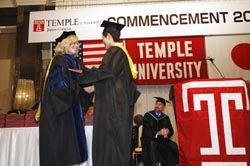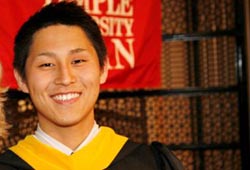‘Konnichiwa!’ from the first graduate of the STHM’s 2+2 Program in Japan
 Photo courtesy Tomoyuki Kiyose, Hiroshi Kojima
and Temple University Japan Betsy Barber (left), associate dean of the School of Tourism and Hospitality Management, presented the first graduate of the school’s 2+2 Program, Manabu Kawamura, with his bachelor’s of science in tourism and hospitality management degree in a special part of Temple University Japan’s graduation, held in Tokyo on June 10. 2+2 students like Kawamura complete the first half of the STHM curriculum at Temple University Japan, and the second two years at Temple’s Main Campus.
|
In many ways, Manabu Kawamura is no different than any other hard-working School of Tourism and Hospitality Management graduate — except that he completed the school’s curriculum in two different countries.
Kawamura is the first graduate of the School of Tourism and Hospitality Management’s (STHM) 2+2 Program, in which the first half of the curriculum, the core, is completed at Temple University Japan (TUJ), while the second two years, including the upper-level classes, are completed at Temple’s Main Campus. On June 10, Kawamura graduated with a bachelor of science degree in tourism and hospitality management in a special segment of the TUJ Graduation in Tokyo. Dr. Ira Shapiro, chairman of STHM, director for programs in Sport and Recreation Management and an STHM professor, taught Kawamura and also gave him professional advice. |
|
“Kawamura was a model student,” Shapiro said, “but what truly set him apart from the other students was his determination. Now with his degree in hand and his command of both English and Japanese, Kawamura is already on his way to a successful career in tourism and hospitality management.” Shapiro introduced Kawamura to the 2+2 Program when he taught a career orientation course in Japan. Shapiro also introduced Kawamura to Tracy Mercer, former general manager of the Four Seasons in Marunouchi, who, along with other general managers from major chain hotels and travel agencies, came to speak to the class. Kawamura later completed his senior internship under Mercer at the Four Seasons Hotel Tokyo at Marunouchi after completing his classes at TUJ and Temple Main Campus. He completed his junior internship at the Sheraton Miyako Hotel in Tokyo. Kawamura was offered a full-time position at the Four Seasons in Tokyo even before he graduated. “When Mercer started talking about the service culture of the Four Seasons, it really grabbed my attention, and that’s when I knew I wanted to work in the hotel business. Working now at the Four Seasons is a dream come true,” Kawamura said. |
|
 Photo courtesy Tomoyuki Kiyose, Hiroshi Kojima
and Temple University Japan Kawamura
|
Students in the 2+2 Program can expect the same rigorous curriculum that all STHM students must complete. Students learn everything about the tourism and hospitality industries, including the legal aspects of the industry, financial management, hotel lodging and operations management, human resource management, accounting, economics and research. |
|
“I understood the American lifestyle, having lived in Michigan for seven years when I was younger, but by taking STHM courses in the U.S., I was able to gain a different cultural perspective on the hospitality industry,” Kawamura said. “The 2+2 Program was amazing because it gave me lots of practice learning experiences about hospitality from different cultural perspectives. I can use that knowledge to build my skills with the special culture found at the Four Seasons in Japan,” he added. Jeffrey Montague, assistant dean of the School of Tourism and Hospitality Management, said the 2+2 Program wassparked by a real-life tourism push. “The Japanese government created a new campaign for tourism, ‘Yokoso Japan,’ which translates to ‘Welcome to Japan,’ and this has spurred the development of hotels in Tokyo and the surrounding areas,” he said. “We initiated the program because after a discussion with Dr. Kirk R. Patterson, dean of TUJ, we realized the potential of Japanese students interested in tourism and hospitality.” Temple Japan has developed partnerships with a variety of hotels and organizations where 2+2 students and graduates can intern and work. TUJ partnerships include the Grand Hyatt Tokyo, the Ritz-Carlton–Tokyo, United Airlines–Pacific, American Express International, the Sheraton Miyako Hotel, Oakwood Premier Tokyo Midtown, Fujimamma’s Restaurant, and of course, the Four Seasons Hotel. “What the 2+2 program offers is professional preparation for students who will be citizens of the world, and who will work for multinational organizations,” Shapiro said. “Students’ professional growth will be on a fast track. Kawamura is already working for one of the great hotels in the world. His future and the future of the 2+2 program are looking very bright.” Several more students will be graduating from the 2+2 program in the coming year. To help these 2+2 students pay to travel to the United States, TUJ and the Tourism and Hospitality program board of advisors threw a fund-raising gala on June 5. The event, which was the first fund-raising gala ever held at Temple Japan, included a silent auction, dinner, dancing and entertainment. STHM representatives attended and added valuable auction items. The event was hosted by TUJ Dean Dr. Kirk Patterson and by TUJ Board of Advisors member Xavier Destribats, general manager of the Grand Hyatt Roppongi Hills in Tokyo, which is where the event took place. Companies and other organizations that donated items for the auction included United Airlines, the Philadelphia Zoo, the Four Seasons Hotel–Philadelphia, La Croix Restaurant, Marriott International, Club Quarters at Rockefeller Center and the Franklin Institute. The event helped TUJ raise almost $50,000 for scholarships, which will help subsidize the cost of traveling to and studying at Temple’s Main Campus for students in the 2+2 Program. — Written by Julia Straka |
|